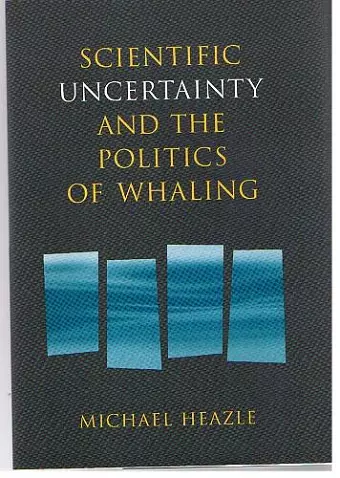Scientific Uncertainty and the Politics of Whaling
Format:Hardback
Publisher:University of Washington Press
Published:23rd Jun '06
Currently unavailable, and unfortunately no date known when it will be back

Examines the how International Whaling Commission policy dramatically shifted from furthering the interests of whaling nations to eventually banning all commercial whaling.
Examines how International Whaling Commission (IWC) policy shifted from furthering the interests of whaling nations to banning all commercial whaling. Focusing on the internal workings of an organization, this book explores the impact of political and economic imperatives on the production and interpretation of scientific research and advice.
In this intriguing study, Michael Heazle examines how International Whaling Commission (IWC) policy dramatically shifted from furthering the interests of whaling nations to eventually banning all commercial whaling. Focusing on the internal workings of a single organization, Heazle explores the impact of political and economic imperatives on the production and interpretation of scientific research and advice.
Central to his work are the epistemological problems encountered in the production of “truth.” Science does not produce incontestable facts that can be expected to lead to consensus decisions; rather, the problematic nature of knowledge itself allows for various interpretations of data depending on the interests of those at the table. It is precisely the nature of scientific knowledge, Heazle argues, that has made uncertainty a tool in service of political objectives. When scientific advice to whaling nations could not with absolute certainty declare whaling practices a threat to stocks, those IWC members with substantial investments of political and economic capital used this uncertainty to reject a reduction in quotas. As perceptions of whaling changed - with the collapse of Antarctic whaling stocks, further diminishing economic returns, and public opinion turning against commercial whaling -- uncertainty switched sides. Nonwhaling members in the IWC, a majority by the late 1970s, claimed that because scientific data could not prove that commercial whaling was sustainable, hunting should stop. Uncertainty was used to protect the resource rather than the industry.
That science cannot be an impartial determinant in policy-making decisions does not render it useless. But Heazle’s analysis does suggest that without understanding the role of scientific uncertainty - and the political purposes for which it is used - international cooperation on wildlife management and broader issues will continue to become bogged down in arguments over whose science is correct.
"This volume provides an insightful look at the intrinsic links between science and policy, reminding the reader that science does not provide objective truths for decision makers to translate into scientifically correct policies. Rather, science is a tool that is interpreted according to its perceived utility, social needs, and political agendas."
* International Journal of Maritime HistoISBN: 9780295986050
Dimensions: unknown
Weight: 527g
240 pages